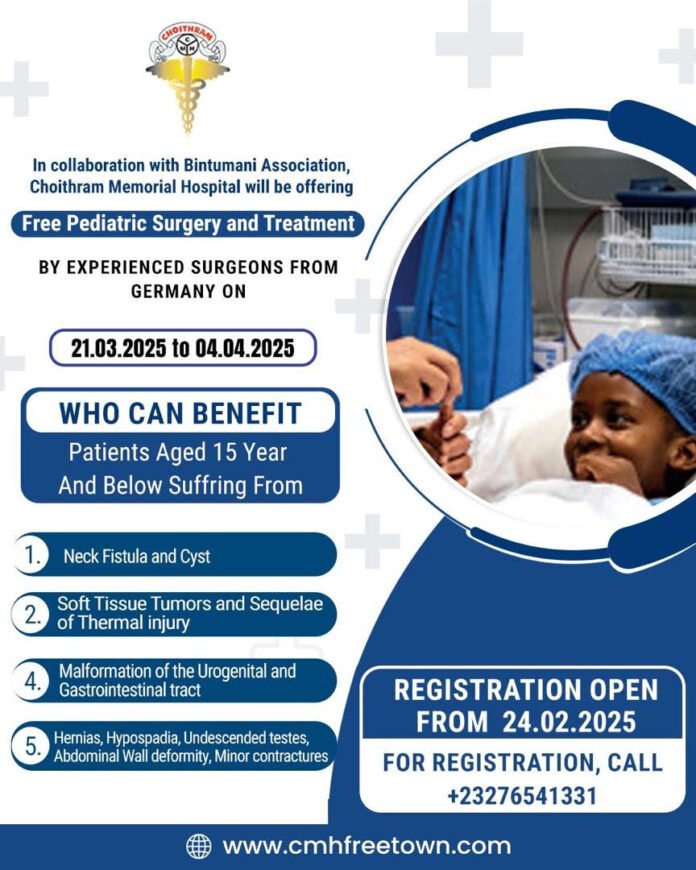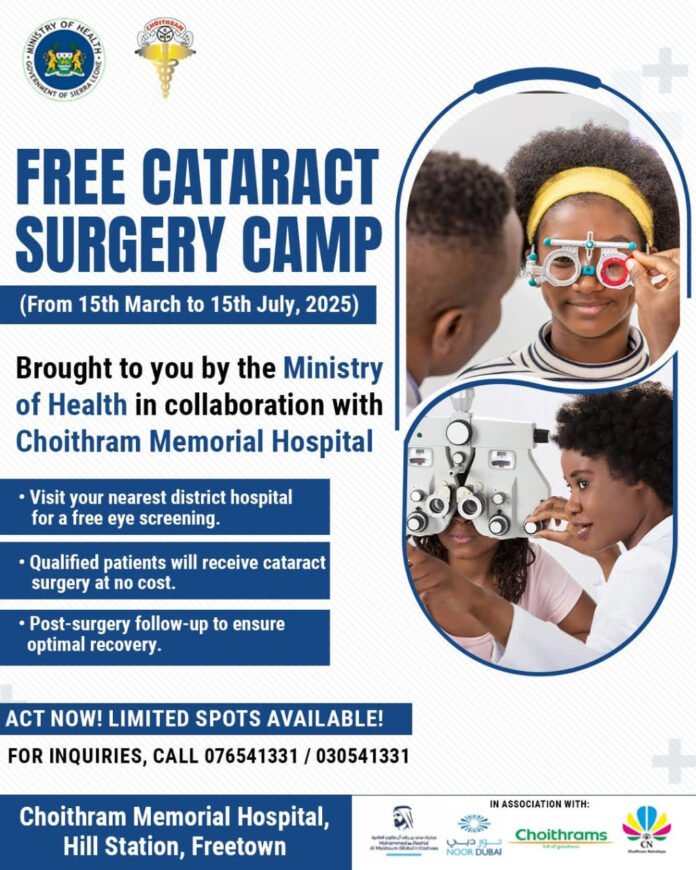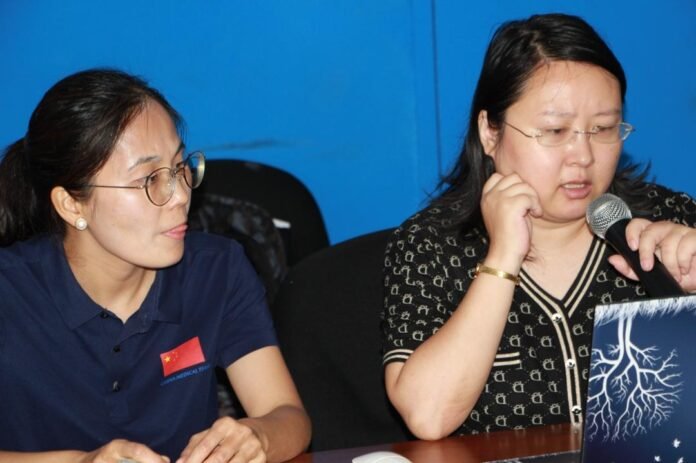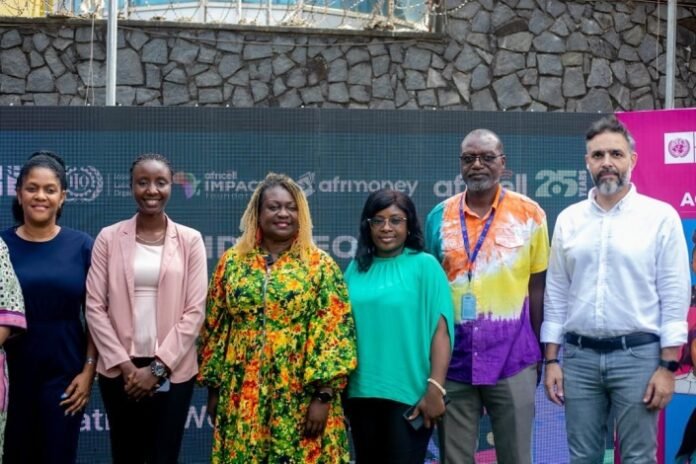By Alvin Lansana Kargbo
As a way of demonstrating the enduring medical partnership between China and Sierra Leone, the Embassy of the People’s Republic of China in Sierra Leone, in collaboration with the Ministry of Health, hosted a Farewell and Welcome Ceremony for the 25th and 26th batches of the Chinese Medical Team. The event, held on Thursday, March 6, 2025, at the Chinese Embassy on Spur Loop, Wilberforce, marked the transition of dedicated medical professionals who have played a pivotal role in strengthening healthcare delivery in Sierra Leone.
For over five decades, China has provided unwavering medical support to Sierra Leone, dating back to 1973 when the first Chinese medical team was deployed. This initiative has since grown into a vital healthcare collaboration, bringing thousands of Chinese doctors and specialists to Sierra Leone to provide critical medical services, training and infrastructure support. The partnership has been particularly evident during times of crisis, with China offering frontline medical assistance during the Ebola outbreak and being the first country to supply COVID-19 vaccines to Sierra Leone.
Beyond emergency response, China’s medical teams have significantly contributed to building healthcare capacity, introducing Traditional Chinese Medicine (TCM) and enhancing specialized medical services, such as cardiology, surgery and disease prevention programs.
Delivering his keynote address, Minister of Health, Dr. Austin Demby, expressed profound gratitude to the Government and People of China for their consistent and selfless partnership in advancing healthcare in Sierra Leone. He praised the 25th Chinese Medical Team for their remarkable contributions, including thousands of life-saving surgeries, training for local medical staff and outreach programs aimed at increasing healthcare accessibility.
Dr. Austin Demby reflected on China’s steadfast commitment, recalling how, during the Ebola outbreak, while others withdrew, China sent a team of experts to combat the disease. He further commended China’s role in the COVID-19 response, where they provided essential medical supplies, vaccines and expertise, reinforcing the deep-rooted ties between the two nations.
He emphasized that healthcare remains a cornerstone of national development, noting that China’s mobile healthcare buses have transformed early disease detection and improved chronic illness management for conditions such as high blood pressure and diabetes.
Encouraging the 26th Chinese Medical Team to build upon the successes of their predecessors, Dr. Austin Demby urged them to continue knowledge transfer, integrate traditional Chinese medicine and expand healthcare services to underserved communities.
Chinese Ambassador to Sierra Leone, Wang Qing, echoed similar sentiments, hailing the outstanding achievements of the 25th Chinese Medical Team during their one-year mission. According to him, the team treated over 24,000 patients, conducted more than 1,000 surgeries and trained 600 local medical professionals. In addition, they extended free medical services to 14,000 people through outreach programs.
Ambassador Wang Qing highlighted the recent establishment of a Traditional Chinese Medicine Center, which is expected to provide affordable and effective treatments for chronic conditions such as hypertension and pain management. He also noted the implementation of HPV DNA testing among 2,000 women, a crucial step toward the elimination of cervical cancer in Sierra Leone.
Pointing to the strong bilateral relationship between the two nations, Ambassador Wang Qing recalled that in 2024, President Xi Jinping met with President Julius Maada Bio twice, further solidifying key agreements on public health, disease prevention and medical infrastructure development.
He announced a $1.2 million agreement for a hospital partnership between China and Sierra Leone, focusing on telemedicine and advanced cardiology care. He also reaffirmed China’s dedication to sending medical teams, training local health professionals and strengthening the Africa Center for Disease Control and Prevention (Africa CDC).
The outgoing leader of the 25th Chinese Medical Team, Dr. Luv ChoaQun, expressed deep appreciation for the opportunity to serve in Sierra Leone. He noted that their yearlong stay was marked by impactful initiatives, including the establishment of the Traditional Chinese Medicine Center and successful public health projects focused on hypertension therapy and HPV screening. He assured that while they were leaving, the mission of medical cooperation would continue with renewed commitment from their successors.
Introducing the incoming 26th Chinese Medical Team, Dr. Liu LongFei emphasized that his 23-member team, dispatched by China’s National Health Commission and Hunan Provincial Health Commission, was fully prepared to take on the medical assistance mission in Sierra Leone.
He announced that the team had already transitioned into the China-Sierra Leone Friendship Hospital and was set to commence full operations the following week. Acknowledging the emotional farewell ceremony for the 25th team, Dr. Liu reassured that his team would build upon past successes and continue serving both Chinese and Sierra Leonean communities with dedication and compassion.
Dr. Augustine Tarawally, the Dean of Jui Hospital, described the farewell and welcome ceremony as a symbolic moment of continuity and shared commitment to healthcare excellence. He commended the 25th batch for their resilience, sacrifices and lasting impact on Sierra Leone’s healthcare landscape.
Welcoming the 26th batch, Dr. Augustine Tarawally expressed confidence in their ability to carry forward the mission, assuring them of strong support from the local medical community. He made a special appeal to the Chinese Embassy to consider including biomedical engineers in future medical teams, citing the urgent need for equipment maintenance and technical expertise in hospital operations.
As the ceremony concluded, it was evident that the partnership between China and Sierra Leone in the health sector remains stronger than ever. Over the years, the collaboration has saved lives, improved medical education and enhanced access to quality healthcare across Sierra Leone.
The seamless transition from the 25th to the 26th Chinese Medical Team highlights China’s long-term commitment to supporting Sierra Leone’s healthcare system. With telemedicine, traditional Chinese medicine and specialized disease prevention programs now in focus, the alliance is expected to continue evolving, bringing better healthcare services to Sierra Leoneans while strengthening diplomatic and cultural ties between the two nations.










